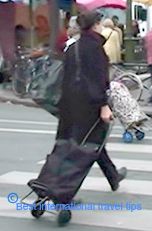Travel first aid kit
A must have in your suitcase
A travel first aid kit is a very important item to pack. What you put in it will vary with the destination of your travel.
I have a very basic one that I take with me on most trips as I tend to go to urban areas where there are lots of pharmacies and clinics.
However, there are things I like to have on hand for emergencies or just the convenience of not having to go shop when I need something and it would be a nuisance to do so.
My kit expands depending on the destination.
|
If you are going on a wilderness camping or hiking trip it would necessitate more items. A trip to somewhere like Africa would require even more in your kit. When I traveled around Vietnam in the early 90‘s I even took mosquito netting and Deet. |
If you will be a long way from medical help then you should have a more complete travel first aid kit.
It is really easy just to purchase a little kit, but I find that it is nice to customize it so that it has exactly what I need. I like lots of different kinds of bandages, gel pads, and blister pads as I have trouble with blisters and inflammation in my feet. Dr. Scholl’s blister pads are fabulous. On a trip to Paris, I was so happy to have them. I would have had to go back to the hotel room if it weren't for the fact that I carried a small kit in my purse.
I take a tube of Facicam and arnica cream for my arthritis along with homeopathy rustox for stiffness and arnica for pain. If you are interested in natural remedies see a homeopath for what would be best for you.

One of my sisters always takes a remedy for motion sickness in her first aid kit, as this is something that she almost always needs.
If you also have this problem get a wrist band made especially for motion sickness or see your doctor for Dramamine scopolamine patches.
Homeopathy remedies are very good if you are interested in trying one of these go to visit a homeopath before leaving to get the correct one for the symptoms you normally get.
Buy good brands for your travel first aid kit. Band aid for instance is a good brand as some cheap brands do not have any stick quality.
If you do make your own kit you will need a sturdy container to hold your items like a large plastic sandwich box with a close fitting lid or a fishing tackle type of storage place. Label it as a travel first aid kit.
Use small plastic bagsto keep things dry before putting in your container.
It is a good idea to get a small first aid instruction booklet.
|
If you can get some emergency numbers for your destination it would be nice to put them into your container. |
There will be items that pertain to your own medical condition that you will need to think of including in your travel first aid kit. Maybe you have a condition where you need a medical alert bracelet. I take my thyroid medicine in my travel first aid kit.
Take the original containers for your prescription medicines. Also take a copy of the prescription. If you are allergic to something like peanut butter or bee stings take two epipens.
Items you may want to include in your travel first aid kit:
- Bandages in different sizes for different wounds.
- Tapes
- Blister band aids and pads
- Gauze pads
- Safety pins
- Antiseptic
- Aloe Vera gel for burns and sun burns. (Look for high concentration of aloe in gel)
- Hydrocortisone cream for allergic reactions and bug bites
- Brave soldier ointment or Neosporin or polysporin
- Some pain relief options, an anti inflammatory and something for fever. Some options would be a acetaminophen and ibuprofen like aspirin, Tylenol, and Advil
- Scissors and tweezers you can get plastic kind to cut tapes, pull splinters, or bee stingers.
- Mosquito repellent like citronella or crocodile natural insect repellent
- Alcohol pads
- Hand wipes, hand sanitizers and antiseptic wipes
- for indigestion and common stomach ailments you may want to take something similar to an over the counter diarrhea medication like Imodium or Pepto-Bismol. (If you get diarrhea it is best to just drink lots of liquids and let it run its course but if you are on the road it is nice to have something to take.
- Cotton balls and swabs like q-tips
- Cough and cold
- Throat lozenges
- Swiss army knife
- (remember this type of item must go in checked luggage)
- Nail clippers
- Sun block
You might also want to consider:
- Mirror
- Protective gloves like non latex for both you and your subject so that you are not transferring bacteria
- Vinegar for minor jelly fish stings. Take the little packs like the ones that you get in restaurants.(not for more serious symptoms or the Portuguese man of war sting-get...medical attention)
- Shake flash light
- No jetlag, homeopathic tablets.
- Thermometer like a strip thermometer
- Antihistamines that don’t cause drowsiness
More depending on your destination:
- Dressing
- Antibacterial ointment or powder one that doesn’t require a bandage is good
- Cold compress
- antibiotic
- Water purifying tabs
- A couple of wooden finger splints
- Emergency blanket (those compact ones that look like foil)
- CPR breathing barrier or face shield
- Melatonin
- Crepe bandages
For the tropics-Africa:
- Mupirocin prescription cream because in the tropics you can get infected very easy.
- For Africa oral salts in case of dehydration
- Iodine tablets for purifying water in an emergency
- Deet you can even put it on your bed sheet
- Mosquito netting in areas where there is malaria
- Waterproof plasters
- See Dr. for prescription medication for controlling fever
- Sterile strips to close wounds
- Sterile dressing
- Your own syringes and sterile needles because the clinics may reuse them you would not want to get aids.
- Be careful of fresh water lakes and streams as they may have bilharzias. See Dr for prescription antibiotics like ciprofloxacin
Last but not least keep your travel first aid kit updated.
Throw out old rusty scissors and nail clippers I know someone that got gangrene from rusty nail clippers.
Check your good until dates and replace anything that is old before you travel.
A few more tips:
- Check for travel advisories concerning any health threats. It maybe mandatory for some destinations to get certain vaccinations.
- Also, you may want to get your regular travel vaccinations updated. Hepatitis A and B, polio booster, tetanus, are some that you should have. Check with your local travel health clinic at least six weeks prior to your trip.
- Check with your Dr. for malaria prevention pills, if you are going into an area that has malaria. You must start taking them before you go on your trip and while you are at your destination and four weeks after you return.
- Drink no caffeine, or alcoholic beverages on the plane only water.
- Do not fly after scuba diving for between 12 and 24 hours


New! Comments
Have your say about what you just read! Leave me a comment in the box below.